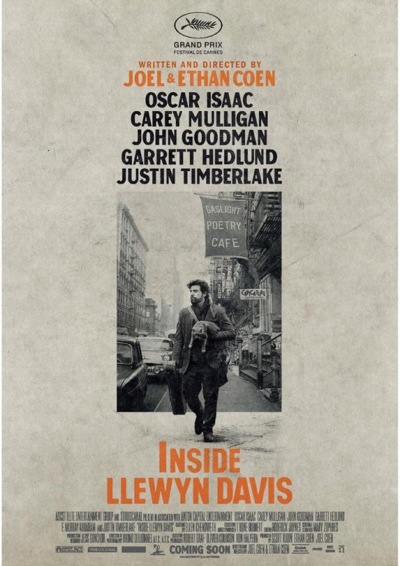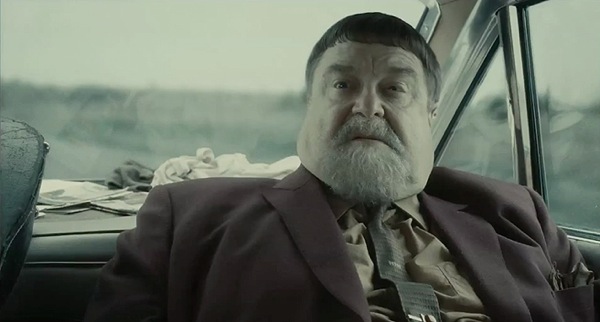
We are taking John Goodman for granted. We really need to stop doing this.
Though awards are hardly the signifier of a successful career in the arts, it is unconscionable that the originator of such indelible characters as Gale Snoats, Charlie Meadows, Lawrence Woolsey and Walter Sobchak has been completely ignored by the Academy of Motion Picture Arts and Sciences. Just look at the aforementioned roles: Goodman has effortlessly segued from cherubic brute to hardworking, salt-of-the-Earth psychopath to lovable showman to splenetic Vietnam vet. He is one of those performers who is truly good in everything - a welcome presence in bad movies, and a vital component of great ones. And yet not a single nomination. If you ask me, it's high time the Oscars find out what happens when you you-know-what a world-class actor in the you-know-where.
There's no better time to atone for past omissions than Goodman's brilliantly off-kilter portrayal of Roland Turner in Joel and Ethan Coen's INSIDE LLEWYN DAVIS. A cantankerous, seemingly narcoleptic jazz musician who's chauffeured around the country by his handsome young valet Johnny Five (Garrett Hedlund), Roland represents what could be the bitter end of the road for frustrated folkie Llewyn (Oscar Isaac). As the trio road trip from New York City to Chicago, Roland regales Llewyn with a variety of elaborately awful anecdotes; he is a spiritually wiped-out artist sifting through the ashes of a career that no one will celebrate when he's gone. Roland could've easily been pompous comic relief, but Goodman deftly nudges the character from delusional has-been to wearily self-aware failure. He's a man running on fumes, just a few miles away from stalling out and drifting off to the side of the road for good.
It's always a joy to watch Goodman work, but it's an event when he teams up with the Coens. Roland may not get the fiery exit of Madman Mundt or the profane explosions of Walter Sobchak, but he is every bit as memorable as those lunatics. In many ways, Goodman is unto himself: there's a type of character that only he can pull off. He is long past due for recognition from his peers, and this is the time to show him the love.
When I chatted with Goodman during the film's Los Angeles press day, I was surprised to find that he's incredibly humble when it comes to discussing his work. He laughs a good deal, but it's a quiet, almost sheepish amusement. He's forthright and about as far from precious about his craft as any actor I've ever spoken to. There's no secret to what he does. Everything you need to know is up there on the screen.
In the below interview, we talk about his creative relationship with the Coens, how he contributed to the look of his character and which line the notoriously on-script Coens allowed to be improvised in THE BIG LEBOWSKI.

Mr. Beaks: It's exciting to get to talk to you for a Coen Brothers film. This is a collaboration that always yields unexpected pleasures.
John Goodman: Tell them that so they'll hire me some more.
Beaks: I'll pass it along. But how does it work between you guys? When there's a role, and they know they want you, what's the discussion like?
Goodman: It's been a long time between drinks with these guys. About fifteen years. Ethan wrote me an email and said, "Madman, we got something for you. Let me know if you're interested." I read it, and, boy, it was love at first sight.
Beaks: Wait, they call you "Madman"?
Goodman: Yeah.
Beaks: As in "Madman Mundt"?
Goodman: Ethan does, yeah. "Hey Madman!" (Laughs)
Beaks: (Laughing) That's the character they chose for your nickname?
Goodman: (Laughing) I don't know. I guess so.
Beaks: From RAISING ARIZONA to now, how has your relationship changed with the Coens?
Goodman: It's gotten richer. I was just thinking last night watching [INSIDE LLEWYN DAVIS] that you could at least do a short story for any of these characters. The Gorfeins, Al Cody or poor Elizabeth, who Llewyn heckles off stage at the Gaslight. They're all interesting. I wanted to know more about them. Stark Sands's character, Carey's character, even Murray's character... they're all rich and interesting. I guess in that respect it seems to have gotten deeper over the years, but they've always written great characters.
Beaks: What about the working relationship?
Goodman: There's nothing different that I've seen. The thing that impressed me the most from jump street was the fact that they know exactly what they want, and they know how to realize it so it doesn't waste a lot of time. It's all very well thought out ahead of time. They have great stories to tell, and they know how to tell them.
Beaks: In a typical film, we'd be expecting a moment of clarity or wisdom from Roland, something that perhaps redeems him and sends our protagonist down the right path. But Roland's dispensing a different kind of wisdom.
Goodman: He might be a key to an alternate future. This is what could happen to someone that's unbending and rigid in the things they present. Living and creating your own support system to deal with that rigidity. This guy's got his own valet. (Laughs) There's another story there. Who knows what that cat's up to?
Beaks: He's not the first valet.
Goodman: Yeah. But to me Roland could've been kind of a flag for Llewyn. "This could be the way you wind up." But I don't know. I'm just pulling shit out of my heinie. (Laughs)
Beaks: It's good shit.
Goodman: (Laughs) "It's really great shit!"
Beaks: How were you presented with this character? Did you see a costume design, accessories, a wig--
Goodman: Oh, that's my hair. That was my idea, too. I wanted my hair to look like Gerry Mulligan, the great baritone sax player. It didn't work out, but I tried. It's a whole stylized, white-attempt-at-black-culture look that Roland had going. The goatee was fake though.
Beaks: He's cultivated a kind of pimp persona.
Goodman: Yeah. A '40s hipster look. Central Avenue.
Beaks: You mentioned that the Coens like to work quickly. How many takes do you generally do with them as opposed to other directors.
Goodman: Nothing excessive, and nothing obsessive. Enough to get what they want. No more than five or six that I can remember. It's stuff that you want to get right. You don't want to waltz through and go, "Oh no, another damn take!" If they see something, you're going to want to hit it. I really trust these guys.
Beaks: And no deviations from the script whatsoever.
Goodman: I don't need any. The only time I can remember that happening was Jeff Bridges throwing in a line calling the Big Lebowski a "human paraquat". That's the only line I ever remember being added. But within that structure you're pretty free to cook because the stuff is so great. I mean, you can create a whole universe in those lines.
Beaks: We see one of the great cat performances in this film. How often were you in the car with that cat?
Goodman: The cat was only there the first time he appeared, and then we just played like he was there.
Beaks: It seems like the kind of thing that would be anathema to directors like the Coens. Cats are pretty unpredictable. They don't take direction well.
Goodman: (Laughs) As far as I know he was a good cat. I didn't hear Oscar complaining too much about him. But animals can be hard to work with.
Beaks: Can you see a progression in the characters that you've played for the Coens? Is there a thematic or emotional link for you?
Goodman: I don't think they're related except that they write these guys and think of me. I prefer not to think about it. If there is a link, I don't want to know about it. I just want to do more.
Beaks: There's something they see in you that you don't want to discover?
Goodman: Yeah. Something hideous. (Laughs) The first time they cast me it was because I had kind of a baby face. That was the whole theme of the film: babies. And Bill Forsythe and I had these big fat baby faces.
Beaks: I just remember that you were coming off of REVENGE OF THE NERDS, which was a big movie for those of us who grew up in the ages.
Goodman: (Laughs) Okay. I don't really think about it much, but I'm glad people still watch it.
Beaks: One film I wish people would talk about more is MATINEE.
Goodman: Yeah, man! I haven't seen that in a long time. Actually, I've only seen it once.
Beaks: Joe Dante showed it recently at one of his New Beverly festivals, and it really plays with an audience. It captures that love of moviegoing and of really working over an audience.
Goodman: That's a thing I got from Joe. Joe was very excited to do a thing about William Castle, and he was excited about the effects that William Castle would try to bring into the theaters. Joe loves movies. Joe's crazy about that stuff. We got a lot of guys that were in '50s horror films in it. Bill Schallert... all these great actors. I've got to see that movie again.
INSIDE LLEWYN DAVIS is currently in limited release. It goes wide on December 20th. John Goodman, Coen Brothers... what do you need, a road map? Go.
Faithfully submitted,
Mr. Beaks
